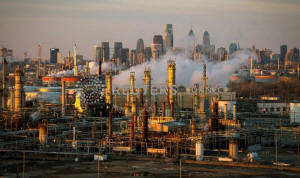|
Exclusive: Philadelphia Energy Solutions
seeks to permanently shut oil refinery - sources
 Send a link to a friend
Send a link to a friend
 [June 26, 2019]
By Jarrett Renshaw and Gavin Maguire [June 26, 2019]
By Jarrett Renshaw and Gavin Maguire
PHILADELPHIA (Reuters) - Philadelphia
Energy Solutions (PES) is expected to seek to permanently shut its oil
refinery in the city after a massive fire caused substantial damage to
the complex, two sources familiar with the plans said on Tuesday.
Shutting the refinery, the largest and oldest on the U.S. East Coast,
would cost hundreds of jobs and squeeze gasoline supplies in the
busiest, most densely populated corridor of the United States.
The refinery, which could still change its plans, is also expected to
begin layoffs of the 700 union workers at the plant as early as
Wednesday, the sources said. The layoffs could include about half of the
union workforce, with the remaining staff staying at the site until the
investigation into the blast concludes, the sources said.

PES is expected to file a notice of intent with state and federal
regulators as early as Wednesday, setting in motion the process of
closing the refinery, the sources said.
A spokesperson for Philadelphia Energy Solutions on Tuesday night
declined to comment on the potential closure and layoffs.
The 335,000 barrel-per-day (bpd) complex, located in a densely populated
area in the southern part of the city, erupted in flames in the early
hours on Friday, in a series of explosions that could be heard miles
away.
The cause of the fire was unknown as of Tuesday, though city fire
officials said it started in a butane vat around 4 a.m. (0800 GMT). It
destroyed a 30,000-bpd alkylation unit that uses hydrofluoric acid to
process refined products. Had the acid caught fire, it could have
resulted in a vapor cloud that can damage the skin, eyes and lungs of
nearby residents.
Before the fire, the refinery had suffered from years of financial
struggles, forcing it to slash worker benefits and scale back capital
projects to save cash. It went through a bankruptcy process last year to
reduce its debt, but its difficulties continued as its cash on hand
dwindled even after emerging from bankruptcy in August.
After bankruptcy, Credit Suisse Asset Management and Bardin Hill became
the controlling owners, with former primary owners Carlyle Group and
Sunoco Logistics, an Energy Transfer subsidiary, holding a minority
stake.
[to top of second column]
|

The Philadelphia Energy Solutions oil refinery is seen at sunset in
front of the Philadelphia skyline March 24, 2014. REUTERS/David M.
Parrott/File Photo

Workers were picking up large debris out of nearby waterways on
Monday, according to pictures seen by Reuters, while other pictures
showed the charred remains of control rooms and burned components.
The blaze was the second in two weeks at the complex, spurring calls
from Philadelphia's mayor for a task force to look into both the
cause and community outreach in the wake of the incidents. A
spokesperson for Mayor Jim Kenney declined to comment on the
potential closure of the plant.
Investigators on the scene are dealing with unstable structures that
need to be certified by engineers, slowing down the inquiry, city
officials said. The investigation could ultimately take months or
perhaps years, they said.
The state Department of Environmental Protection said they have
concerns about the integrity of storage tanks on site, the agency
said on Tuesday. The U.S. Chemical Safety Board is also
investigating the incident.
U.S. gasoline futures rose as much as 5.4% on Wednesday to $1.9787 a
gallon, the highest since May 23. The front month price was at
$1.945 at 0551 GMT. Futures are up 8.9% since Thursday's close.
The rally in U.S. gasoline futures has pushed U.S. gasoline prices
above European and Asian markets, raising the prospects for U.S.
imports.

“Chances are that (the wider price spread) could open up the arbs
between U.S. Gulf/Europe and PADD 1,“ said Matthew Chew, principal
oil analyst at IHS Markit, referring to the Petroleum Administration
for Defense District (PADD) 1, the designation the U.S. government
uses for the East Coast in its weekly oil storage report.
(Reporting By Jarrett Renshaw; editing by Christian Schmollinger)
[© 2019 Thomson Reuters. All rights
reserved.]
Copyright 2019 Reuters. All rights reserved. This material may not be published,
broadcast, rewritten or redistributed.
Thompson Reuters is solely responsible for this content. |